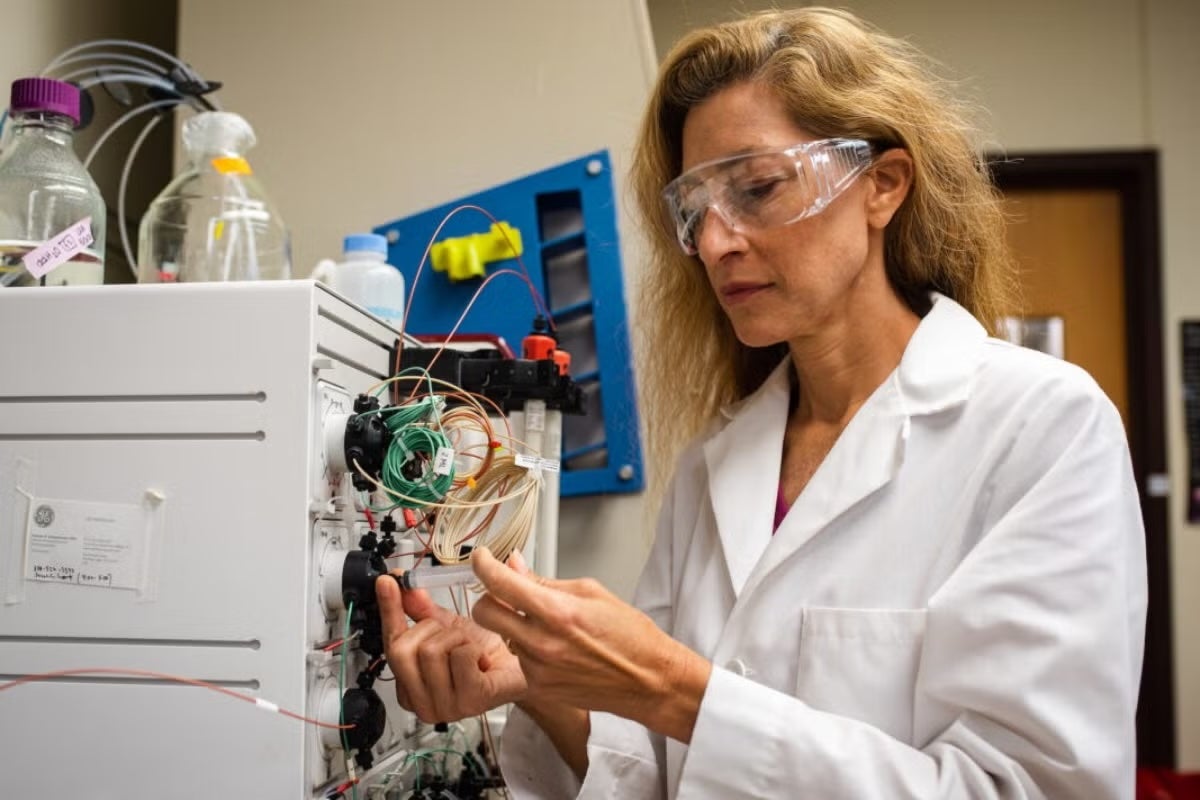Experimental Vaccine Against Respiratory Syncytial Virus (RSV) Elicits Strong Immune Response
After decades of research, an effective RSV vaccine now seems within reach

An experimental vaccine against respiratory syncytial virus (RSV), one of the leading causes of infectious disease deaths in infants, has shown early promise in a Phase 1 human clinical trial. A team of researchers, including The University of Texas at Austin's Jason McLellan, report today in the journal Science that one dose of their vaccine candidate elicited large increases in RSV-neutralizing antibodies that were sustained for several months.
People contract RSV in all stages of life, but it's most dangerous in the very young and the very old. The virus causes pneumonia, bronchiolitis and other lower respiratory tract diseases. Every year, millions of people become sickened by RSV, and more than 100,000 die, mostly in areas that lack access to modern medical care. For infants under 1 year of age, RSV is second only to malaria for infectious disease deaths.
Barney Graham and Peter Kwong of the National Institute of Allergy and Infectious Diseases' Vaccine Research Center (VRC), along with McLellan, a former postdoctoral researcher at VRC and now an associate professor at UT Austin, spearheaded the development of the vaccine candidate DS-Cav1.
Scientists have tried to create an RSV vaccine using traditional methods for more than 50 years — and so far, none has worked. Instead, McLellan and his colleagues took a new approach, called structure-based vaccine design.
It was already known that a certain part of RSV, called the F protein, triggers the human immune system to produce antibodies. But the F protein is a shape shifter — before it infects a cell, it takes one shape and then during infection, it shifts to a second shape. If the immune system encounters an RSV virus with the F protein in the first shape, it makes potent antibodies. But if the protein is in the second shape, fewer antibodies are elicited, and they are not very effective. Producing RSV vaccines using traditional methods usually leads to F proteins in the second shape and a poor antibody response.
This is where the structure-based approach comes in. First, the researchers used a technique called X-ray crystallography to determine the atomic-level structure of the F protein in the first shape. Next, they re-engineered the F protein to take away its shape-shifting ability, locking it in the shape that elicits the best antibodies.

Before RSV begins infecting a cell, its F protein is in the shape shown on the left. During infection, it rearranges itself into the second shape. The new RSV vaccine was made by locking the F protein into the first shape so that the immune system could produce the best antibodies. McLellan and his colleagues determined these two structures in 2013. Image credit: Jason McLellan.
In 2013 they tested several versions as a vaccine in both mice and nonhuman primates. These protein variants elicited high levels of neutralizing antibodies and protected the animals against RSV infection.
"Our first time testing these stabilized molecules in animals, the response was 10-fold higher than anything anyone had ever seen before," McLellan said. "And at that point, we're thinking, 'This is it. We've got it.' That was exciting."
The most promising of these vaccine candidates, DS-Cav1, was selected for clinical evaluation and subsequently manufactured by the VRC.
The Science report is an interim analysis of data from the first 40 healthy adult volunteers enrolled in the trial, which began in the National Institutes of Health Clinical Center in 2017. Researchers found that the vaccine candidate elicits a greater than 10-fold increase in RSV-neutralizing antibodies, compared with the number of antibodies a person produces naturally from RSV exposure earlier in life.
The results are promising, but McLellan is careful to put them in perspective.
"The Phase 1 just asks: Is it safe and is it eliciting the types of antibodies and response that we were hoping to see?" he said. "It still needs to go through Phase 2 and Phase 3, looking at efficacy such as, is it reducing the severity of disease, or is it reducing hospitalizations?"
Many drugs fail to make it all the way through clinical trials. But if this one does, or another based on the same F protein structure that he helped discover, McLellan says it could be a game changer.
"If it works reasonably well and we prevent 70 to 80 percent of all deaths, just think of all the little infants and toddlers we'd save," McLellan said. "There aren't that many vaccines in the world, and so if we're able to actually participate in making one that works and saves lives, that would be awesome."
Additional information about the Phase 1 trial of DS-Cav1 (also known as VRC 317) is available at clinicaltrials.gov by using the trial identifier NCT03049488. Final results of the trial are expected next year.
The University of Texas at Austin is committed to transparency and disclosure of all potential conflicts of interest. The university investigator involved in this research, Jason McLellan, has submitted required financial disclosure forms with the university. McLellan is an inventor on several patent applications related to this research filed by the National Institutes of Health, from which he is receiving royalties.



